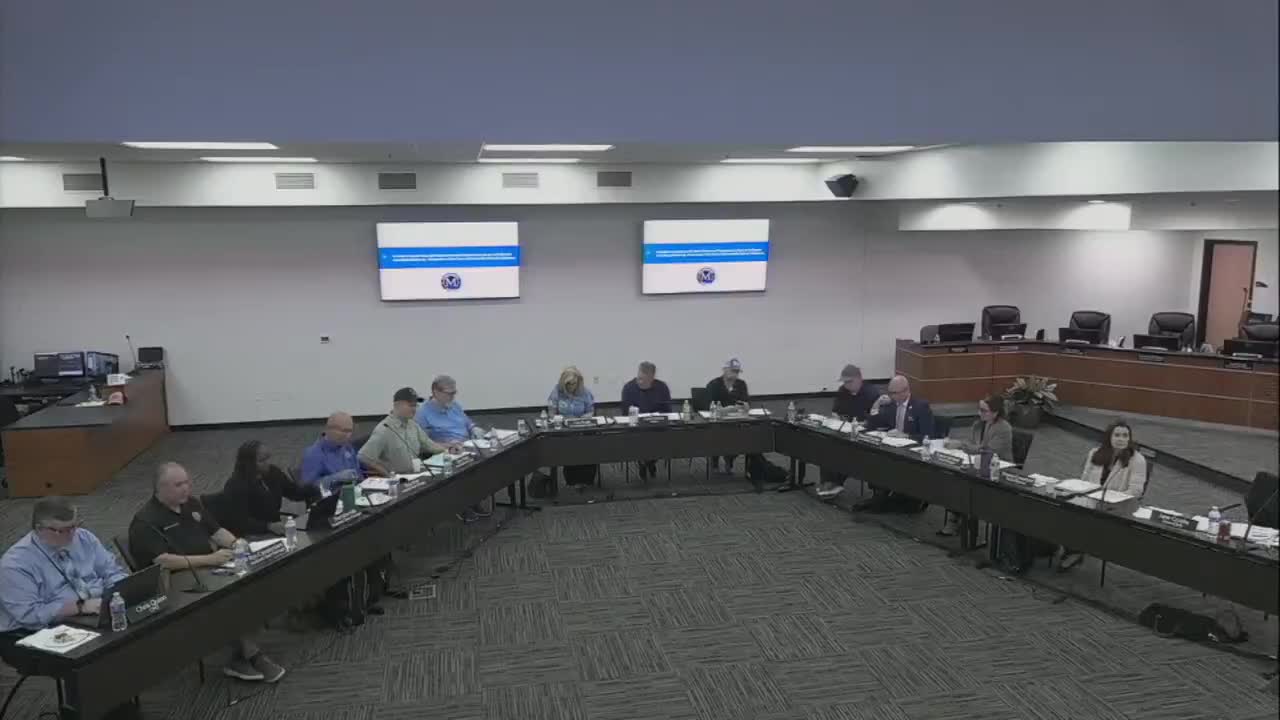Mooresville staff propose tighter erosion rules, update stormwater ordinance to protect Lake Norman
Get AI-powered insights, summaries, and transcripts
Subscribe
Summary
Town staff presented changes to chapter 25 (post-construction stormwater) and a new chapter 27 (erosion and sedimentation control) that would give the town local permitting authority, tighten design standards, require bonds and expand enforcement; first reading scheduled and state delegation needed for an effective Jan. 1 takeover.
Mooresville town staff on Wednesday presented linked updates to the town code designed to tighten controls on construction runoff and give the town local authority over erosion during construction.
Deputy Water Resources Director Marissa Houston told the Board of Commissioners the proposed amendment to chapter 25 of the town code would align local post‑construction stormwater rules with North Carolina Session Law 2023‑108 (House Bill 48) and change how developers fund maintenance of stormwater control measures. "We're just proposing a few minor adjustments to our chapter 25 stormwater ordinance," Houston said, noting two edits: replacing the term "escrow account" with "segregated funds account" and changing the timing of an initial 5% funding deposit to occur at project completion/approval rather than prior to plat.
Engineering Services Manager Ashton Walker outlined a separate but related draft erosion and sedimentation control ordinance (chapter 27) intended to move permitting for construction‑phase erosion from Iredell County to the town. "Erosion and sedimentation control is dirty water. So, it's everything that's happening during construction," Walker said, describing the proposal as part of an effort to provide "a higher level of service" and faster field inspections.
Why it matters: the drafts are intended to reduce sediment and other construction runoff reaching streams that drain to Lake Norman, expand the town's enforcement toolkit, and make developers financially responsible for construction‑phase stabilization. Walker said the town would follow the state DEQ model ordinance while adopting some more stringent local standards.
Key provisions and differences from the state minimum
- Local control and delegation: staff said the town is pursuing DEQ delegation of the sedimentation control program; the DEQ process requires the town to adopt the local ordinance before delegation. "The DEQ delegation, procedure requires that the local municipality adopt the ordinance prior to them officially delegating the authority to us," Walker said. If approved by the state commission, staff said the town would seek an effective program takeover date of Jan. 1, with the local adoption process including two readings (first reading Monday; second reading Nov. 3) and a state Sedimentation Control Commission review on Nov. 20.
- Threshold and design changes: the draft would require an erosion control plan for any disturbance greater than a half acre (the state minimum is 1 acre). The town would adopt a 25‑year design storm standard (larger than the common 10‑year design) and increase required sediment basin surface area and volume.
- Bonds/performance guarantees: the town would require a plan review fee and a performance guarantee at plan approval so the town can stabilize a site and finish work if a developer abandons a project.
- Watershed protections: the draft expands enhanced design standards beyond the state's narrow "high quality water" definition to include the town's watershed protection overlay and areas draining to Lake Norman.
- Limits on cleared area during construction: the draft limits the amount of land allowed to be uncovered at one time to 20 acres without additional approval; the town engineer could allow larger phased clearings where justified.
- Enforcement tools: the town would gain explicit authority to issue notices of violation, stop work orders, assess per‑day penalties, make claims on performance guarantees and require cleanup. Walker emphasized education and compliance as primary goals but said enforcement authority is part of the package.
Concerns from commissioners and residents
Commissioners raised questions about visible clearcutting on large sites such as the Timber Road extension and about financial impacts to downstream property owners. Commissioner Weiss asked, "Is there any provision in here for restitution for the impact that they have on others?" Walker replied, "That is a great question. And I can't speak to our legal ability to, require them to to pay any kind of restitution. However, if the sediment gets into the storm drain system, that would also be considered an illicit discharge under our NPDS permit." Walker said she would work with legal staff to explore options.
Board members also suggested operational tactics, such as a quick-response cleanup enforcement similar to a practice described by one commissioner in a neighboring jurisdiction where a contractor is charged a fee and a water truck removes tracked mud if a site operator fails to clean a road the same day.
Process and next steps
Staff said the town will present the first reading of the erosion ordinance and the stormwater amendment at the meeting on Monday, with a second reading and adoption scheduled for Nov. 3. If the town adopts the ordinance, staff will request formal DEQ delegation at the state Sedimentation Control Commission meeting on Nov. 20 and, if granted, implement the local program Jan. 1.
What remains unresolved
Staff and commissioners requested follow‑up on legal options for restitution to downstream homeowners or homeowners associations, the precise costs of dredging or pond maintenance caused by construction runoff, and implementation details for road‑cleaning enforcement. Walker and Marissa Houston committed to return with clarifications and to coordinate with town legal staff and the county where necessary.
Ending: The board did not take a final vote on either ordinance at the pre‑agenda meeting; staff emphasized the items will return for formal readings and that delegation from DEQ is required before the town assumes full local authority.
